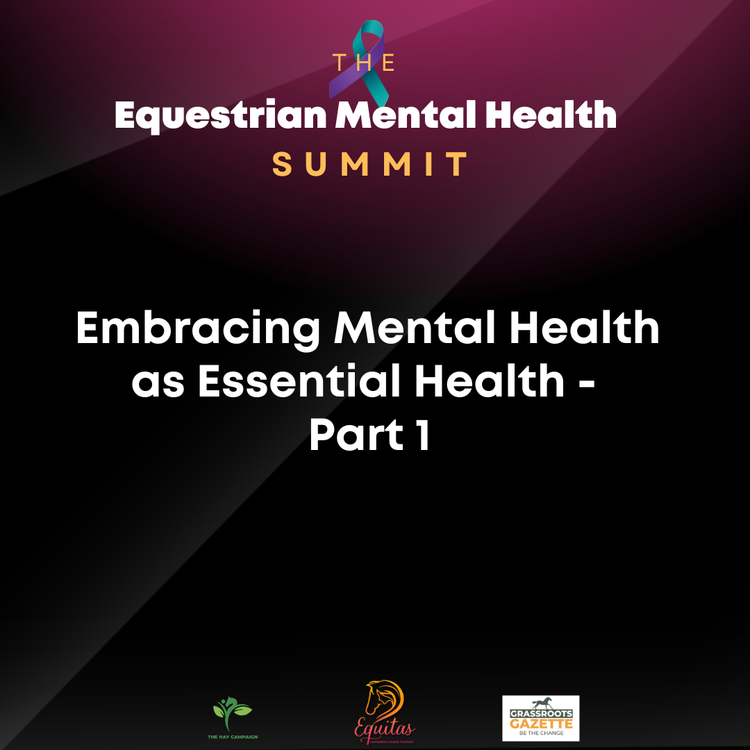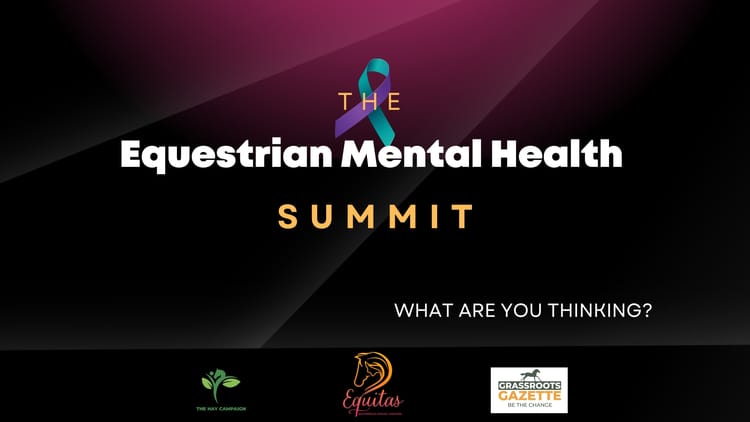Addressing the Silent Crisis: Mental Health in the Equine Industry - Part 1

As we step into a new year, the equine community faces a heart-wrenching reality.
The recent losses of several respected members—including the head of an association, someone special to us who relocated from the UK to establish a fantastic venue and became part of our family, a long-serving and well respected racing manager, and an now after the weekend an ex-jockey who is gone far too soon—have left us in mourning. It is heartbreaking and our thoughts are with their families.
These were not only professionals in their fields but cherished individuals whose contributions touched many lives. Their departures underscore a pressing issue that extends beyond the racetrack or competing: the mental well-being of those in our industry.
Suicide within the equine community is a painful subject, yet it's crucial that we bring it to the forefront of our discussions. The pressures of the equine world are immense and multifaceted, encompassing everything from the physical demands of the sport to the mental and emotional resilience required to compete and manage daily stresses.
Research, including a significant study referenced from TandFonline, indicates that jockeys, often viewed purely for their athletic prowess, are particularly vulnerable. This study revealed that a staggering 79% of jockeys surveyed experienced symptoms of common mental disorders (CMDs) such as depression, anxiety, and substance abuse.
These findings are a stark reminder that our community must do more to support its members, not only in times of physical injury but also in mental health crises. The challenges faced by those in the racing sector—exhaustive work hours, financial pressures, and the constant demand for peak performance—are mirrored across the broader equine industry. These stressors can erode mental resilience and diminish the sense of community that is so vital in combating mental health issues.
Yet, there is hope, and there are actionable steps we can take to foster a more supportive environment. First, we must normalise conversations about mental health. Just as we wouldn’t hesitate to discuss a broken bone or a physical rehabilitation plan, we should openly address psychological well-being. Creating spaces at events for mental health resources, similar to the medical tents for physical injuries, would be a step forward. These could provide information, support contacts, and a quiet place for individuals to seek help or simply take a moment to breathe.
The launch of the "How Are Ya" (HAY) Campaign in 2023, which continued into January of this year, marked a step towards dismantling the stigma surrounding mental health within our community. Supported by an unprecedented coalition of equestrian organisations, businesses, and associations, the HAY Campaign has initiated crucial dialogues across the spectrum of equestrian disciplines. By encouraging everyone within our community to openly inquire about each other's well-being with a simple HAY "How Are Ya?" We are starting to foster a culture where mental health is openly discussed and addressed.
But clearly, THIS HAS NOT BEEN ENOUGH and WE HAVE SO MUCH MORE TO DO.
The equine world is inherently demanding, characterised by the pressures of competition, the isolation of individual sports, and the financial strains of maintaining competitive standards or these days just owning horses. These elements can create a breeding ground for mental health issues if left unchecked.
This campaign has started to highlight the importance of checking in on one another but also emphasised the need for systemic changes to better support the mental health of all industry participants. WE NEED TO START THESE CHANGES NOW!!!!
To address these challenges, there is a growing consensus on the need for continuous, accessible mental health resources. Initiatives must extend beyond occasional campaigns to become embedded within the fabric of our daily operations. This means regular mental health training for all levels of staff, from grooms to top-level executives, ensuring that everyone is equipped to recognise signs of distress and knows how to respond appropriately.
Moreover, the introduction of mental health professionals and counsellors who are familiar with the unique pressures of the equine industry can provide targeted support. These experts should be available at major competitions and events, offering immediate assistance to anyone showing signs of mental stress or just needing to talk. Establishing permanent on-site resources at training facilities and stables can also provide ongoing support, ensuring that help is always at hand.
As we continue to build on the foundations laid by the HAY Campaign, our community's commitment to mental health must evolve into more structured, robust support systems. This includes the integration of mental health awareness into the core training programs for young riders and professionals, promoting resilience and coping strategies as fundamental skills alongside riding and horse care.
Looking ahead to the Equitas Changemaker Event this upcoming Friday, May 10th, we are set to take a groundbreaking step forward with the announcement of Ireland's first suicide prevention conference specifically for the equine industry. This conference aims to unite the entire spectrum of the equestrian community—from amateur riders to professional competitors and industry leaders—to collaboratively address and strategize on preventing further tragedies.
This event will not only provide an opportunity to learn from mental health experts but also to hear firsthand from those who have faced these challenges. It will serve as a platform for sharing experiences, strategies, and innovations in mental health support, ensuring that the momentum created by the HAY Campaign continues to grow and leads to lasting change.
In conclusion, while we have started to address the mental health crisis in our industry, there is much more to be done. We cannot bring back those we have lost, but we can honour their memories by committing to protect and improve the mental health of every member of our community. It is time for us to stand together—talk alone is no longer sufficient.
We have lost too many colleagues and loved ones, and now we must transform our grief into decisive action. This Friday, at the Equitas Changemaker Event at Barberstown Castle, we will take a bold step forward by announcing Ireland's first suicide prevention conference tailored specifically for the equine industry.
We call on leaders and every member of our community to rally behind this cause, to commit to real change, not just in words but in action. Let this be the moment we come together to ensure that our shared passion for equestrian sports is matched by a deep, unwavering commitment to the mental well-being of every single person in our community
Until Next Time,
Shane




